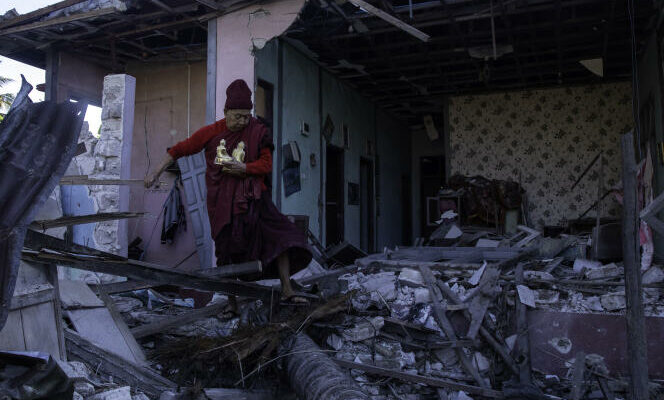The rocky hills topped with Christian crosses have given way to yellowed rice fields. In the distance, the white smoke from the burns drew a curtain over the plain. Then we pass without firing a shot from the countryside to the northern suburbs of Loikaw, a grid of gardens, wooden houses and flowered villas, some of which bear traces of combat.
The capital of Kayah state, in the east of the country, is entirely besieged by anti-junta resistance. The residents have left. And in the ghost town operates a sort of shadow army, the Karenni Nationalities Defense Forces (KNDF), named after the dominant ethnic group, formed after the military coup of 1er February 2021 which toppled the government of leader Aung San Suu Kyi. Two and a half years after their creation in May 2021, the KNDF launched, on November 11, 2023, a vast offensive to bring down the capital of Kayah State – Karenni State, as the locals call it.
Since then, the junta administration has packed up and the Tatmadaw, the Burmese army, has been pushed back to its limits: at the end of January around a thousand soldiers and officers still occupied the large military base below the airport, a rectangle 1 and a half kilometers long. “Small groups of soldiers still hold the prison and six official buildings in the city center, including the state parliament and the local government headquarters”explains to us, in a hideout in the suburbs, Commander Dede, thin black mustache and goatee, his forehead furrowed by a day of vigilance.
The road to the capital is cut
“These army positions are well protected, transformed into bunkers. They have tanks. Heavy weapons. But they are only defending themselves”, continues the veteran. In his fifties, he is one of the oldest in the group of KNDF commanders, these men who are talked about throughout the resistance. Khun Bedu, the great leader, is a famous dissident. Mawi, number two, a Bamar (the majority ethnic group in Burma) born in Loikaw, ran an organic farming farm. Commander Dede went through the Free Burma Rangers, an association of American evangelicals which trains first aid workers for the front.
Apart from these strongholds, the soldiers have no freedom of movement: only pick-ups of fighters of the “revolution” circulate in the suburbs: proud-looking young people, automatic rifles slung over their shoulders, black helmets on their heads or hair in bun in karenni fashion. The airport is unusable, under fire from the rebels. The road to Naypyidaw, capital of Burma, is cut. Army positions can only be resupplied by helicopter.
You have 75% of this article left to read. The rest is reserved for subscribers.
